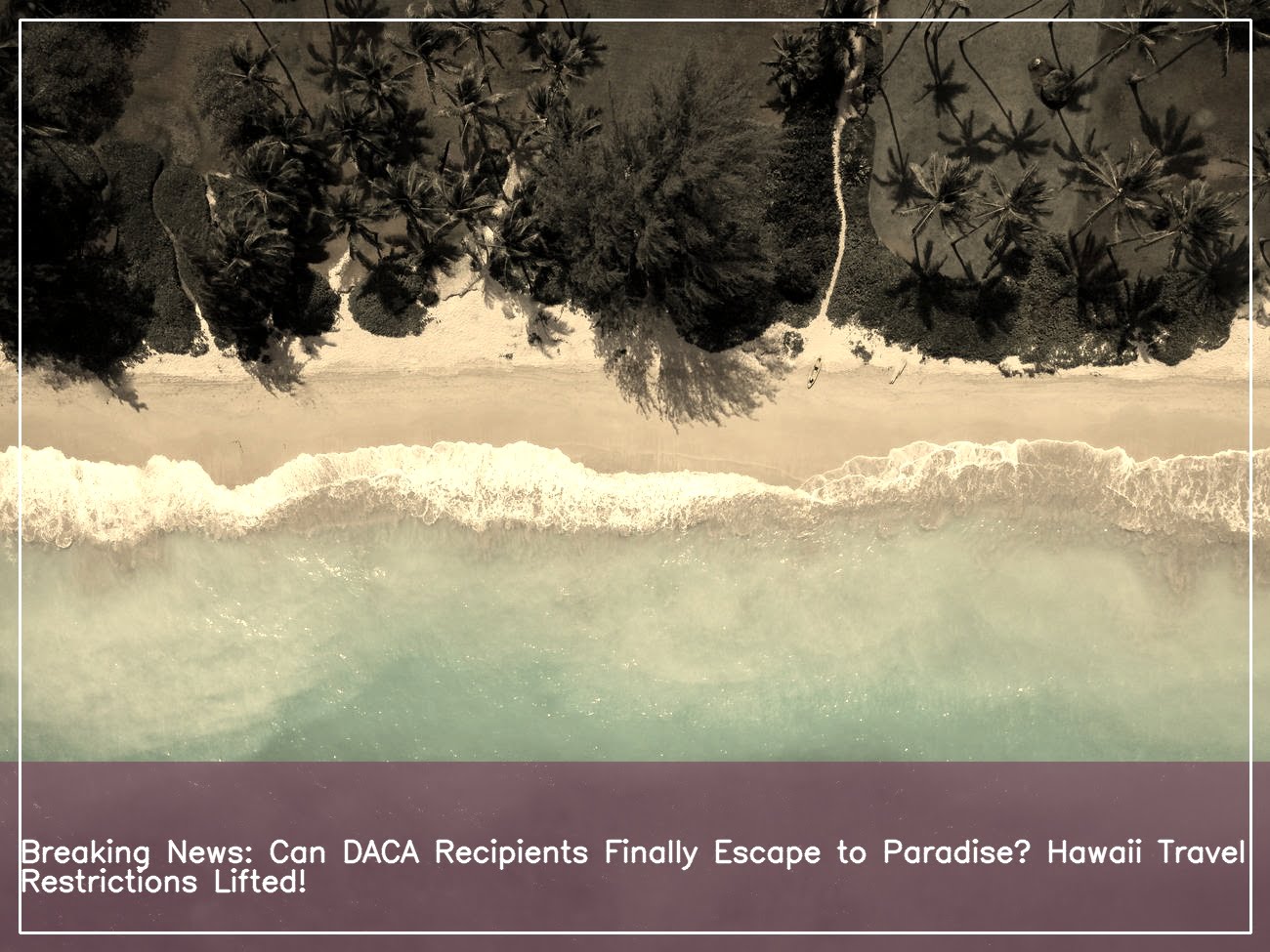Can DACA recipients experience the wonders of Hawaii? Yes, they can! Deferred Action for Childhood Arrivals (DACA) recipients are granted permission to enter and reside in the U.S., and Hawaii is a U.S. state. In this article, we will explore the nuances of travel policies and provide guidance for DACA recipients aspiring to bask in the beauty of the Aloha State.
Key Takeaways:

DACA recipients can travel to Hawaii if they meet certain conditions and have advance parole.
Advance parole allows DACA recipients to travel outside the continental U.S. for specific reasons.
DACA recipients must apply for advance parole at least 90 days before their intended travel date.
DACA recipients do not need a visa to travel to Hawaii.
DACA recipients must have a valid passport or other travel document to enter and leave the United States.
DACA recipients should keep copies of their DACA approval notice and advance parole document with them while traveling.
DACA recipients should be prepared to answer questions from immigration officials about their DACA status and travel plans.
Can DACA Recipients Travel to Hawaii: Frequently Asked Questions
Embarking on global adventures can be exhilarating, but it can also be daunting for those with Deferred Action for Childhood Arrivals (DACA) status. However, you’ll be thrilled to know that DACA recipients can travel to Hawaii with proper documentation and authorization. Let’s dive into some critical questions to address any concerns you may have:
Can DACA recipients travel outside the U.S.?
Ordinarily, DACA recipients are restricted from international travel. However, advance parole, also known as a travel permit, can be obtained to temporarily leave the United States for specific reasons, including:
- Humanitarian: Visiting sick relatives or attending a funeral.
- Educational: Participating in study abroad programs or conferences.
- Employment: Business trips or temporary work assignments.
How do DACA recipients apply for advance parole?
To apply for advance parole, DACA recipients must submit Form I-131, Application for Travel Document, to U.S. Citizenship and Immigration Services (USCIS). The application should be submitted at least 90 days before the intended travel date.
What documents do DACA recipients need to travel to Hawaii?
When traveling to Hawaii with DACA, individuals must carry the following documents:
- A valid DACA approval notice
- Advance parole document
- Valid passport or other travel document
- Proof of purpose and duration of travel
Do DACA recipients need a visa to travel to Hawaii?
No, DACA recipients do not require a visa to travel to Hawaii, as it is a U.S. state. However, they must have a valid passport or other travel document to enter and leave the United States.
What should DACA recipients do when encountering immigration officials while traveling?
Remain calm and polite when interacting with immigration officials. Be prepared to answer questions about your DACA status and travel plans. Present your DACA approval notice, advance parole document, and other relevant documents as requested.
Can DACA recipients be denied entry into Hawaii?
While unlikely, DACA recipients may be denied entry into Hawaii if they have a criminal record or if there are concerns about their identity or travel purpose.
Remember, policies and regulations are subject to change; it’s essential to stay updated with the latest information from credible sources. If you have specific questions or concerns, consult with an immigration attorney for personalized advice.
Get all the necessary Cambodia travel tips to make your trip to Cambodia an unforgettable one.
Are you a felon who wants to travel to Mexico? Find out if can felons travel to Mexico in this comprehensive guide.
Wondering if you can enter Canada without a visa? Check out this article to find out if can Guyanese travel to Canada without a visa.
If you’re an H1B visa holder, you may be wondering if you can travel to Canada. Learn about the requirements and restrictions for can H1B visa holder travel to Canada in this informative guide.
Planning to buy travel insurance from another country? This article covers everything you need to know about can I buy travel insurance from another country, including the benefits, risks, and legal considerations.
DACA recipients should carry their valid Employment Authorization Document (EAD) and DACA approval notice when traveling.
Key Takeaway:
- Ensure your Employment Authorization Document (EAD) is current and unexpired.
- Carry your original DACA approval notice.
- Keep copies of both documents in a safe place.
- Be prepared to present these documents to employers, government officials, or law enforcement if requested.
- These documents serve as proof of your legal status and work authorization in the United States, facilitating a smoother travel experience.
DACA recipients have the right to work legally in the U.S. thanks to current, valid Employment Authorization Documents (EADs). To that end, employers are prohibited from asking about an applicant’s citizenship status and should not treat DACA recipients differently.
When going through the Form I-9 process, DACA recipients can learn more about their rights from both government and non-government sources.
What should DACA recipients do when traveling?
- Carry your valid EAD and DACA approval notice at all times. These documents serve as proof of your legal status and work authorization in the United States.
- Make copies of your EAD and DACA approval notice and keep them in a safe place. This will ensure that you have a backup in case your originals are lost or stolen.
- Be prepared to present your EAD and DACA approval notice to employers, government officials, or law enforcement if requested. This will help to avoid any delays or problems.
Remember
DACA recipients have the right to travel freely within the United States. By carrying your valid EAD and DACA approval notice, you can help to ensure that your travel experience is smooth and hassle-free.
Sources:
In some cases, DACA recipients may be subject to additional screening or questioning when traveling.
In some instances, DACA recipients may undergo additional screening or questioning during their travels. This is because their immigration status requires further verification to ensure compliance with regulations. While most DACA recipients pass through routine security checks without issue, there’s a chance they may be asked to provide additional documentation or answer questions related to their status.
Key Takeaways:
Documentation: Keep your DACA approval notice, advance parole document (if applicable), valid passport, and other relevant travel documents readily available for inspection by immigration officials.
Courtesy: When interacting with immigration personnel, maintain a polite and respectful demeanor. Answer questions honestly and directly, avoiding any confrontational behavior.
Preparation: Familiarize yourself with the specific travel requirements for your destination and have a clear understanding of your rights as a DACA recipient.
Transparency: Be prepared to explain your DACA status and travel purpose to immigration officials if requested.
Patience: Additional screening or questioning may cause delays, so plan accordingly and remain patient throughout the process.
Legal Assistance: If you have concerns or encounter difficulties during your travels, consider consulting with an immigration attorney for guidance and support.
Stay Informed: Keep yourself updated on the latest travel policies and regulations that may impact DACA recipients.
Document Everything: Maintain a record of your interactions with immigration officials, including the date, time, location, and nature of any questioning or screening you may experience.
Sources:
It is important for DACA recipients to stay up-to-date on any changes to travel policies that may affect them.
In an ever-changing tapestry of immigration regulations, it is vital for DACA recipients to stay vigilant, current, and plugged into the evolving landscape of travel policies. The global pandemic and its ever-shifting restrictions serve as a stark reminder that policies are not set in stone, and what holds true today may be obsolete tomorrow. Remaining abreast of these developments ensures DACA recipients can plan their travels with confidence and assurance.
Key Takeaways:
- Adapt and Be Flexible: Embrace the fact that travel policies are fluid, and adaptability is key.
- Stay Informed: Actively seek out credible sources of information, including official government websites and reputable news outlets, to stay informed about the latest travel policies and updates.
- Consult Experts: Consider seeking advice from immigration attorneys or legal experts specializing in DACA matters for personalized guidance tailored to your situation.
- Document and Organize: Keep meticulous records of your DACA status, travel documents, and any correspondence with government agencies. Organization is your ally when navigating the complexities of travel policies.
- Monitor Legal Developments: Follow immigration-related news and legal proceedings to stay informed about potential changes to DACA and travel policies.
Sources:

FAQ
Q1: Can DACA recipients travel to Hawaii without any restrictions?
A1: No, DACA recipients must apply for and receive advance parole approval before traveling to Hawaii or any U.S. territory outside the continental United States.
Q2: What is advance parole, and how do DACA recipients apply for it?
A2: Advance parole is a travel document that allows DACA recipients to temporarily leave and re-enter the United States for humanitarian, educational, or employment reasons. To apply, DACA recipients must file Form I-131, Application for Travel Document, with USCIS at least 90 days before their intended travel date.
Q3: What documents do DACA recipients need to provide when applying for advance parole?
A3: Along with Form I-131, DACA recipients must submit their valid DACA approval notice, a copy of their passport or other travel document, evidence of their DACA status, and proof of the purpose and duration of their trip.
Q4: Can DACA recipients travel to Hawaii with just their DACA approval notice?
A4: No, DACA recipients need both a valid DACA approval notice and approved advance parole to travel to Hawaii or any U.S. territory outside the continental United States.
Q5: What should DACA recipients do if they have questions about traveling to Hawaii or applying for advance parole?
A5: DACA recipients with questions about travel restrictions or the advance parole application process should consult with an immigration attorney or contact the U.S. Citizenship and Immigration Services (USCIS) for guidance.

